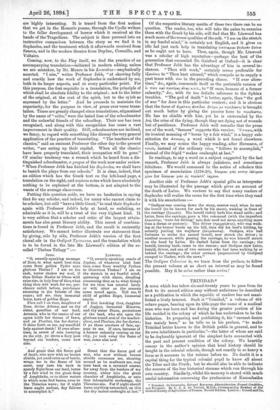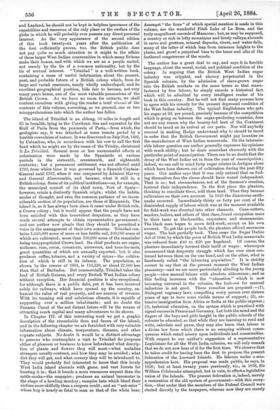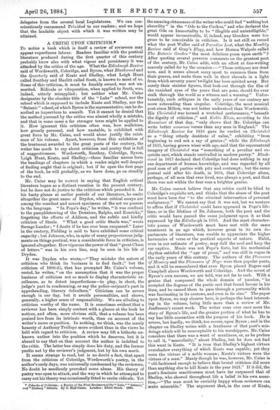TRINIDAD.*
A BOOK which has taken six-and-twenty years to pass from its first to its second edition may without unfairness be described as a publication in which the republic of readers has not mani- fested a lively interest. Such is "Trinidad," a volume of 484 octavo pages, bearing upon its title-page the name of a medical man who was born and has during the greater portion of his life resided in the colony of which he has undertaken to be the historian. In preparing and publishing it, his "earnest desire has mainly been," as he tells us in his preface, "to make Trinidad better known to the British public in general, and to its own inhabitants in particular,"—the latter of whom are said to be deplorably ignorant of the simplest facts connected with the past and present condition of the colony. We heartily concur in the author's opinion that local history should be taught in the colonial schools, though not exactly in so heavy a form as it assumes in the volume before us. No doubt it is a capital thing for the typical colonial pupil to know all about the Tiber and the Pruth; but he should also be able to indicate the courses of the less historical streams which run through his own country. Similarly, whilst his memory is stored with much useful information concerning the productions of Eamschatita • Trinidad its Geography, Natural Resource", Administration, Present Condition• and Prorpeets. By L. A. A. Do Vertnil, M.D.S., Corresponding Member of the Central Society of Agriculture of France. Second Edition. London : Cassell and Co.
and Lapland, he should not be kept in helpless ignorance of the capabilities and resources of the only place on the surface of the
globe in which he will probably ever possess any direct personal interest. As the very appearance of the second edition of this book twenty-six years after the publication of the first sufficiently proves, too, the British public does not pay quite so much attention as it might to the affairs of those larger West Indian communities in which many Britons make their homes, and with which we are as a people united, not merely by the tie of a common nationality, but by the tie of mutual interest. " Trinidad " is a well-written book, containing a mass of useful information about the present, past, and probable future of a British colony which, from its large and varied resources, nearly wholly undeveloped, and its excellent geographical position, bids fair to become, not very many years hence, one of the most valuable possessions of the British Crown. As we have no room for extracts, we shall content ourselves with giving the reader a brief résumé of the contents of this volume, correcting, as we proceed, one or two misapprehensions into which the author has fallen.
The island of Trinidad is an oblong, 50 miles in length and 65 in breadth, lying in the Carribean Sea and separated by the Gulf of Paria from the peninsula of Paria,—from which, the geologists say, it was detached at some remote period by a terrible convulsion of nature. It was discovered on July 31st, 1492, by Columbus, who, in accordance with his vow to call the first land which he might see by the name of the Trinity, christened it La Trinidad. Several more or less unsuccessful efforts at colonisation were made by the Spaniards at various periods in the sixteenth, seventeenth, and eighteenth centuries; but a permanent settlement was not effected until 1783, from which time it was governed by a Spanish Captain- General until 1797, when it was conquered by Admiral Harvey and General Abercrombie, and became, what it still is, a British colony. Some of its political institutions—as, for example, the municipal council of its chief town, Port of Spain— however, retain a distinctly Spanish origin; whilst the habits, modes of thought, and even the common parlance of no incon- siderable section of its population, are those of Hispaniola. The island is, as it has always been since it came under British rule, 11, Crown colony; but it would appear that the people have not been satisfied with this benevolent despotism, as they have made several attempts to obtain representative government; and our author now pleads that they should be permitted a -voice in the management of their own concerns. Trinidad con- tains 1,020,000 acres of more or less fertile soil, 100,C00 acres of which are cultivated ; more than 700,000 acres of the remainder being unappropriated Crown land. Its chief products are sugar, molasses, rum, cocoa, cocoanuts, arrowroot, and tous-les-mois, great quantities of which are annually exported ; but it also produces coffee, tobacco, and a variety of spices—the cultiva- tion of which is still in its infancy. The population, as shown by the census of 1881, is 153,128, or about 27,000 less than that of Barbados. But commercially, Trinidad takes the lead of British Guiana, and every British West Indian colony without exception. Her financial position is else exceptional, for although there is a public debt, yet it has been incurred solely for railways, which have opened up the country, en- hanced the value of real property, and are sources of revenue. With its teeming soil and salubrious climate, it is capable of supporting over a million inhabitants ; and no doubt the Panama Canal of the not distant future will be the means of attracting much capital and many adventurers to its shores.
In Chapter III. of this interesting work we get a graphic description of the remarkable flora and fauna of the island; and in the following chapter we are furnished with very valuable information about climate, temperature, diseases, and other cognate subjects. No doubt it would be a distinct advantage to persons who contemplate a visit to Trinidad for purposes .either of pleasure or business to know beforehand what descrip- tion of plants and flowers they will meet—what maladies strangers usually contract, and how they may be avoided ; what diet they will get, and what scenery they will be introduced to. They would probably feel interested to know that this lovely West India island abounds with game, and vast forests for `hunting it in; that it breeds a more venomous serpent than the rattle-snake—the mapepire ; produces an animal barometer in the shape of a howling monkey; vampire bats which bleed their victims more skilfully than a surgeon could; and an " ant-eater" whose hug is nearly as fatal to man as that of the white bear.
Amongst "the lions" of which special mention is made in this volume, are the wonderful Pitch Lake of La Brea, and the truly magnificent cascade of Maraccas ; but, as may be supposed, a country so rich in lofty mountains and lovely valleys, abounds in caves and grottoes, mineral deposits, rivers, and water-falls, many of the latter of which leap from immense heights to the plains, and growl a perpetual bass to the tenor and alto of the feathered songstresses of the woods.
The author has a great deal to say, and says it in forcible language, about the moral, social, and political condition of the colony. In arguing that the British West Indian sugar industry was crippled, and slavery perpetuated in the Spanish colonies, by the admission of slave-grown sugar into the British markets on the same terms as that manu- factured by free labour, he simply records a historical fact which will be admitted by every intelligent reader of his book in this country. But he will not find many persons here to agree with his remedy for the present depressed condition of the West Indian industry. The typical Englishman who gets his sugar at 3d. per pound, precisely because of the competition which is going on between the sugar-producing countries, does not see any reason why the bounty-fed beet of the Continent should be taxed on its arrival at our ports. Nor will anybody succeed in making Hodge understand why he should be taxed in order that the British Government might pay bounties on the manufacture of West Indian muscovada. On the intermin- able labour question our author generally expresses his opinions with much ability ; but he deals somewhat obscurely with the particular point of emancipation. There can be no doubt that the decay of the West Indies set in from the year of emancipation; indeed, we can call to mind forty sugar estates in Antigua alone which have been thrown out of cultivation during the past fifty years. Our author says that it was only natural that on find- ing themselves free the slaves should have waxed independent. That is so ; but circumstances, not of the freemen's creation, fostered their independence. In the first place the planters, thinking to conciliate them, sold them land. Thus they became cultivators on their own account. In 1843 the disastrous earth- quake occurred. Immediately thirty or forty per cent. of the diminished supply of labour which was at the moment available for field-work was diverted into other channels. Cane-cutters, weeders, boilers, and others of that class, found occupation more to their taste as blacksmiths, carpenters, and stonemasons. The black man began to scorn field-work, except on his own account. To get the people back, the planters offered enormous wages. The bait partially took. Then came the Sugar Duties Act of 1816, by which the price of British West India muscovado was reduced from £40 to £20 per hogshead. Of course, the planters immediately lowered their tariff of wages : whereupon commenced that desperate struggle which has ever since con- tinued between them on the one hand, and on the other, what is facetiously called "the labouring population." It is strictly correct to say that at the present moment the West Indian peasantry—and we are more particularly alluding to the young people—view manual labour with absolute abhorrence ; and as this feeling increases with the " education " which is now becoming universal in the colonies, the look-out for manual industries is not good. Three remedies are proposed :—(1), Stringent vagrancy laws, compelling every person over sixteen years of age to have some visible means of support ; (2), ex- tensive immigration from Africa or India at the public expense ; (3), technical education, on the system which is practised with signal success in France and Germany. Let both the mind and the fingers of the boys and girls taught in the public schools of the colonies be educated, so that while they are learning to read and write, calculate and parse, they may also learn that labour is a divine law from which there is no escaping without conse- quences which entail misery upon individuals and communities. With respect to our author's suggestion of a representative Legislature for all the West India colonies, we will only remark that we do not now hear of it for the first time. We observe that he takes credit for having been the first to propose the present federation of the Leeward Islands. He labours under a mis- apprehension here. His proposal was made public, he says, in 1858; but at least twenty years previously, viz., in 1838, Sir William Colebrooke attempted, but in vain, to effect a legislative union of the Islands. The present federation is, indeed, merely a restoration of the old system of government—with this excep- tion,—that under that the members of the Federal Council were elected directly by the taxpayers, whereas now they are merely delegates from the several local Legislatures. We can con- scientiously recommend Trinidad to our readers ; and we hope that the laudable object with which it was written may be attained.




































 Previous page
Previous page